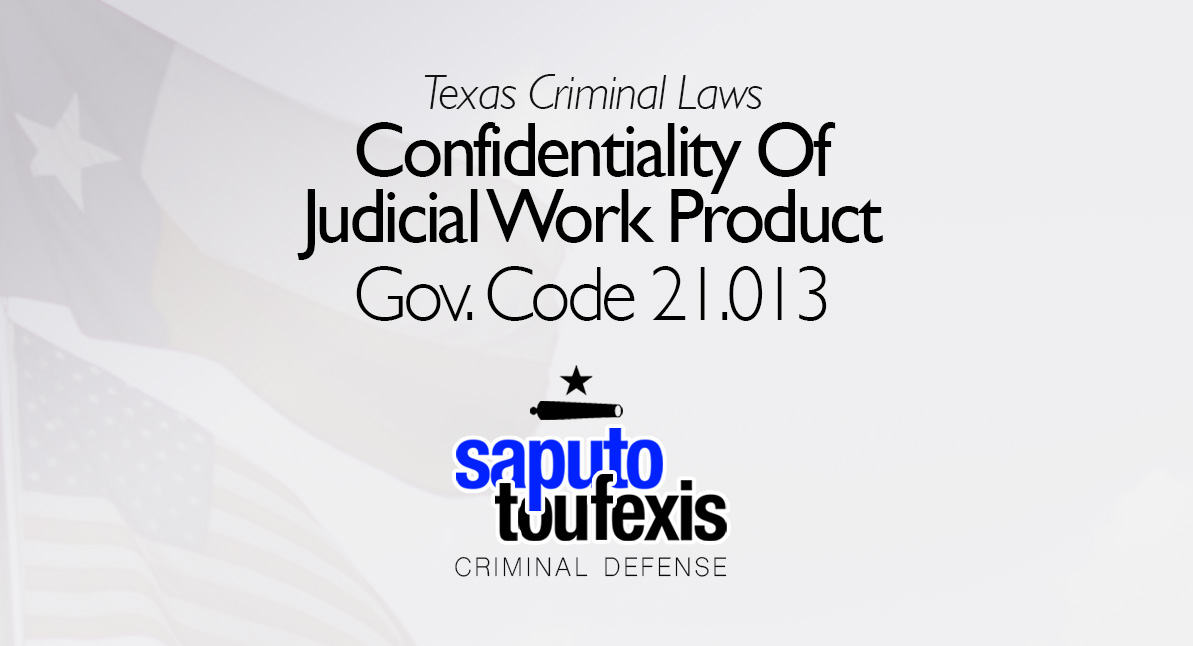The Texas Confidentiality of Judicial Work Product law makes it illegal for anyone with access to non-public judicial work product, other than a justice or judge, to leak confidential court documents.
FAQs about the
Confidentiality Of Judicial Work Product law in Texas
- What is the current Texas law about Confidentiality of Judicial Work Product?
- What is the penalty for a Texas Confidentiality Of Judicial Work Product offense?
- What changed in 2025?
- How can I be charged with a Confidentiality Of Judicial Work Product offense in Texas?
- What is the statute of limitations for Confidentiality Of Judicial Work Product in Texas?
- Can you get probation for Confidentiality Of Judicial Work Product in Texas?
- What level of crime is Confidentiality Of Judicial Work Product in Texas?
After the highly-publicized leak of the draft United States Supreme Court order in Dobbs v. Jackson Women’s Health Organization, the Texas legislature was inclined to criminalize any similar types of leaks in Texas courts.
Have you been charged with Confidentiality of Judicial Work Product? Contact us today to discuss legal representation.
or Text or Call (888) 239-9305
The Texas Legislature enacted this law in 2023 and codified at Texas Government Code Section 21.013. The law went into effect on September 1, 2023.
In 2025, the legislature narrowed the definition of judicial work product under this law.
The Government Code classifies the Texas Confidentiality Of Judicial Work Product law under Title 2 “Judicial Branch,” Chapter 21 “General Provisions.” Learn more about the Texas offense of Confidentiality of Judicial Work Product below.
What is the current Texas law about Confidentiality of Judicial Work Product?
AV Preeminent Texas lawyer Paul Saputo provides the current law defining Confidentiality of Judicial Work Product in Government Code Section §21.013, as follows:[1]
(e) A person, other than a justice or judge, with access to non-public judicial work product commits an offense if the person knowingly discloses, wholly or partly, the contents of any non-public judicial work product to a person who is not a justice, judge, court staff attorney, court clerk, law clerk, employee of an agency established under Chapter 71 or 72, or other court staff routinely involved in crafting an opinion or decision for an adjudicatory proceeding.
This offense was created by the 88th Texas Legislature in 2023,[2] effective September 1, 2023.[3]
“Judicial work product” includes materials prepared or communications made in the course of an adjudicatory proceeding and expressly includes drafts of opinions or orders and memoranda of law. Effective September 1, 2025, it does not include information related to the location of a person who is required to submit to electronic monitoring under Article 42.035, Code of Criminal Procedure, or as a condition of community supervision, parole, mandatory supervision, or release on bail.[4]
What is the penalty for a Texas Confidentiality Of Judicial Work Product offense?
Confidentiality Of Judicial Work Product in Texas is punished as a Class A misdemeanor.[5]
What changed in 2025?
Old law (before September 1, 2025). “Judicial work product” included written, electronic, or oral materials prepared or communications made in the course of an adjudicatory proceeding and expressly included drafts of opinions or orders and memoranda of law.[6]
New law (effective September 1, 2025). The legislature narrowed the definition by stating that “judicial work product” does not include information related to a person who is required to submit to electronic monitoring of the person’s location as part of an electronic monitoring program under Article 42.035, Code of Criminal Procedure, or as a condition of community supervision, parole, mandatory supervision, or release on bail.[7]
When it applies. The amendment takes effect September 1, 2025, and governs conduct on or after that date.[8]
How can I be charged with a Confidentiality Of Judicial Work Product offense in Texas?
You can be charged with Confidentiality Of Judicial Work Product in Texas if the state’s attorneys believe that each of the elements of §21.013(d) as described in the section above has been met.
What is the statute of limitations for Confidentiality Of Judicial Work Product in Texas?
As a misdemeanor, Confidentiality Of Judicial Work Product charges have a two-year limitations period.[9]
Can you get probation for Confidentiality Of Judicial Work Product in Texas?
The Texas Code of Criminal Procedure allows both judges and juries to grant probation for Confidentiality Of Judicial Work Product, and judges are also allowed to accept deferred adjudication plea deals.[10]
What level of crime is Confidentiality Of Judicial Work Product in Texas?
The Government Code classifies Confidentiality Of Judicial Work Product as a Class A misdemeanor.
Learn more about the penalty range for this offense in the section above.
Legal References:
^1. Texas Government Code §21.013. This law is current as of 2025.^2. SB 372 88th Texas Legislature (RS), Section 1^3. SB 372 88th Texas Legislature (RS), Section 3^4. Texas Government Code §21.013(a)(1), as amended by SB 1020, 89th Texas Legislature (RS), Section 5^5. Texas Government Code §21.013(f)^6. See SB 1020, 89th Texas Legislature (RS), Section 5^7. Texas Government Code §21.013(a)(1), as amended by SB 1020, 89th Texas Legislature (RS), Section 5^8. SB 1020, 89th Texas Legislature (RS), Section 8^9. See Code of Criminal Procedure 12.02(a)^10. See Chapter 42A, Texas Code of Criminal Procedure, Art. 42A.054, Art. 42A.056, Art. 42A.102










